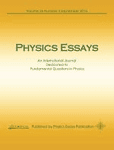
PHYSICS ESSAYS
Scope & Guideline
Illuminating the Path of Scientific Inquiry
Introduction
Aims and Scopes
- Theoretical Physics and Interpretation:
The journal emphasizes new theoretical frameworks and interpretations of established physical theories, particularly in areas such as quantum mechanics, relativity, and electromagnetism. This includes reevaluating classical theories and proposing alternative explanations for phenomena. - Quantum Mechanics and Quantum Gravity:
A significant focus on quantum mechanics, including studies on quantum entanglement, wave-particle duality, and attempts to unify quantum mechanics with gravity, indicating a deep interest in foundational issues and the quest for a comprehensive theory. - Critique of Established Theories:
The journal often publishes critical analyses of well-established theories, such as Einstein's relativity and quantum mechanics, suggesting potential errors and offering new insights that challenge the status quo. - Interdisciplinary Approaches:
Research published in the journal frequently integrates concepts from various fields, including thermodynamics, kinetic theory, and even consciousness, indicating a broad and holistic view of physics. - Experimental and Theoretical Validation:
The journal also values the relationship between theory and experiment, as seen in titles discussing experimental proofs and theoretical models that align with empirical observations.
Trending and Emerging
- Quantum Information and Entanglement:
Recent publications have highlighted quantum entanglement and its implications, marking a trend towards exploring the foundational aspects of quantum information theory and its potential applications. - Reassessment of Relativity:
There is a noticeable increase in critical examinations of Einstein's theories, particularly special and general relativity, suggesting a growing interest in alternative models and interpretations that challenge established views. - Theoretical Models of Gravity:
Emerging theories regarding gravity, particularly those that seek to unify it with quantum mechanics, are gaining attention, indicating a significant trend towards developing new gravitational models that address current gaps in understanding. - Philosophical Implications of Physics:
The intersection of physics and philosophy is becoming increasingly relevant, with discussions around the nature of time, consciousness, and the fundamental structure of reality gaining traction in recent publications. - Exploration of Dark Matter and Energy:
Papers addressing dark matter and dark energy theories have seen an upsurge, reflecting ongoing efforts to understand these enigmatic components of the universe and their implications for cosmology.
Declining or Waning
- Classical Mechanics:
Despite its historical significance, papers strictly focused on classical mechanics have become less frequent, possibly overshadowed by more contemporary discussions in quantum mechanics and relativity. - Traditional Electromagnetism:
Research centered solely on classical electromagnetism appears to be decreasing, as newer interpretations and theories that incorporate quantum aspects or alternative frameworks gain traction. - Basic Experimental Physics:
While experimental validation remains important, the journal has seen a decline in papers that merely replicate classical experiments without novel interpretations or implications, suggesting a shift towards more theoretical explorations. - Causality in Classical Contexts:
The exploration of causality within classical physics contexts is less prominent, as discussions increasingly focus on quantum interpretations and their implications for causality.
Similar Journals
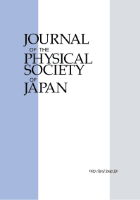
JOURNAL OF THE PHYSICAL SOCIETY OF JAPAN
Elevating the Standards of Research Excellence in JapanThe JOURNAL OF THE PHYSICAL SOCIETY OF JAPAN, published by the Physical Society of Japan, has been at the forefront of advancing knowledge in the field of Physics and Astronomy since its inception in 1946. With a commendable reputation reflected in its Q2 ranking within its category for 2023, this journal serves as a vital platform for disseminating high-quality research and innovative concepts. Researchers and professionals alike can engage with cutting-edge studies and reviews that span a diverse range of topics pivotal to the physical sciences. Although the journal does not currently operate with an open access model, it maintains a robust impact on the global physics community, evidenced by its placement in the 59th percentile among a competitive pool of 243 journals. With an unwavering commitment to bridging theory and application, the JOURNAL OF THE PHYSICAL SOCIETY OF JAPAN continues to inspire and cultivate scholarly discourse and collaboration across disciplines.
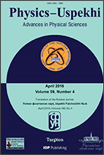
PHYSICS-USPEKHI
Connecting Researchers Through High-Impact SciencePHYSICS-USPEKHI, published by Uspekhi Fizicheskikh Nauk, is a prominent peer-reviewed journal in the field of physics and astronomy, reaching researchers and professionals since its inception in 1993. With an ISSN of 1063-7869 and an E-ISSN of 1468-4780, this esteemed journal has been classified as Q2 in the Physics and Astronomy category based on the 2023 quartiles, ranking 74 out of 243 journals in its Scopus classification, placing it in the 69th percentile. Although currently not an open access journal, it provides invaluable insights and advancements in the field, fostering an environment for scholarly exchange and collaborative research. Based in Moscow, Russia, PHYSICS-USPEKHI continues to shape the landscape of theoretical and experimental physics, inviting submissions that contribute to its rich legacy of high-impact scientific discourse.

INTERNATIONAL JOURNAL OF MODERN PHYSICS A
Pioneering insights into the fabric of the universe.INTERNATIONAL JOURNAL OF MODERN PHYSICS A, published by WORLD SCIENTIFIC PUBL CO PTE LTD, stands as a pivotal platform in advancing the frontiers of research within the fields of Astronomy and Astrophysics, Atomic and Molecular Physics, and Nuclear and High Energy Physics. Established in 1989, this journal has systematically contributed to the scientific community, with a demonstrated impact as indicated by its Q2 category rankings across these critical disciplines in 2023. Researchers and professionals are encouraged to engage with its rigorous peer-reviewed content, fostering a deeper understanding of modern physics theories and experimental breakthroughs. Although the journal operates under a conventional access model, it remains a vital resource for those seeking to disseminate their findings and stay abreast of cutting-edge developments. With an emphasis on quality and breadth of research, the journal continues to attract submissions from leading physicists and scholars, enhancing its reputation as a key academic resource.
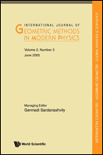
INTERNATIONAL JOURNAL OF GEOMETRIC METHODS IN MODERN PHYSICS
Illuminating the Geometric Foundations of Theoretical PhysicsINTERNATIONAL JOURNAL OF GEOMETRIC METHODS IN MODERN PHYSICS is a leading academic publication dedicated to the interdisciplinary exploration of geometric methods in the realms of modern physics. Published by WORLD SCIENTIFIC PUBL CO PTE LTD, this esteemed journal is based in Singapore and acts as a critical platform for researchers, professionals, and students seeking to delve into the intricacies of modern theoretical physics and its geometric foundations. With an impressive Scopus ranking placing it in the 64th percentile of its category, the journal highlights innovative research and developments from 2005 to 2024 within its scope. While currently not offering Open Access, it remains a vital resource for the dissemination of valuable knowledge in its field, contributing significantly to the advancement of physics and astronomy. We encourage the academic community to explore this exceptional journal for cutting-edge insights and to further enhance their understanding of geometric applications in modern scientific inquiry.

JETP LETTERS
Fostering Breakthroughs in Theoretical and Experimental ScienceJETP LETTERS, published by MAIK NAUKA/INTERPERIODICA/SPRINGER, is a prestigious journal in the field of physics and astronomy, which plays a pivotal role in disseminating groundbreaking research and innovative ideas since its inception in 1969. With an ISSN of 0021-3640 and an E-ISSN of 1090-6487, this journal aligns well with the interests of both seasoned researchers and emerging scholars, having achieved a 2023 category rank of Q3 for miscellaneous topics within physics and astronomy. Located in the United States at 233 SPRING ST, NEW YORK, NY 10013-1578, JETP LETTERS serves as a critical resource for its readership, offering exclusive insights and advancements across diverse areas of physics. While not open access, it hosts a collection of articles that refine theoretical approaches and experimental methods, providing both knowledge and inspiration to professionals and academics seeking to make impactful contributions to the scientific community. The journal’s quality is reflected in its Scopus ranking, where it stands at 39 out of 81 in the multidisciplinary category, placing it in the 52nd percentile, thus underscoring its significance and reliability as a scholarly outlet.

BRAZILIAN JOURNAL OF PHYSICS
Connecting Researchers to the Heart of PhysicsBRAZILIAN JOURNAL OF PHYSICS, published by SPRINGER, is a prominent platform dedicated to the dissemination of research within the realm of physics and astronomy. With an ISSN of 0103-9733 and E-ISSN of 1678-4448, this esteemed journal has been contributing to the field since its inception in 1996, and it continues to be pivotal in showcasing innovative studies and breakthroughs. The journal is categorized in the Q4 quartile for the year 2023, reflecting a dedicated focus on advancing knowledge across a variety of disciplines, particularly in general physics and astronomy, where it ranks 126th out of 243 in Scopus rankings. Although it currently does not operate under an open-access model, it remains an invaluable resource for researchers, professionals, and students eager to enhance their understanding of complex physical principles and developments. The journal is committed to promoting high-quality research, bridging gaps in knowledge, and fostering collaboration within the global physics community.

Living Reviews in Relativity
Unveiling the Latest in Relativity ResearchLiving Reviews in Relativity, published by SPRINGER INT PUBL AG, stands at the forefront of the field of relativity, offering a dynamic platform for the dissemination of high-quality, peer-reviewed research. Since its inception in 1998, this Open Access journal has committed to providing continuous updates and comprehensive reviews, making it an indispensable resource for researchers and scholars in the categories of Physics and Astronomy, where it holds a prestigious Q1 ranking. With its impressive Scopus ranking of #1 out of 81 in the Physics and Astronomy (miscellaneous) category, it boasts a remarkable 99th percentile ranking, underscoring its significance in advancing scientific discourse. Operating out of Switzerland, Living Reviews in Relativity serves as a vital conduit for sharing knowledge and insights, fostering collaborative research, and promoting timeless discussions in the ever-evolving landscape of relativistic physics.
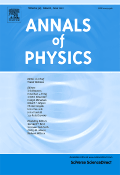
Annals of Physics
Connecting scholars to the latest breakthroughs in Physics.Annals of Physics is a premier journal published by Academic Press Inc Elsevier Science, specializing in the expansive field of Physics and Astronomy. Since its inception in 1957, this journal has played a pivotal role in disseminating high-quality research and advancements across various sub-disciplines of physics. With a notable impact factor making it rank in the Q1 category for 2023, it stands among the top tier of scholarly publications, specifically sitting at Rank #63 out of 243 in the field, placing it in the 74th percentile according to Scopus metrics. Researchers are encouraged to submit their findings to reach a broad audience without the constraints of Open Access fees, promoting extensive visibility within the academic community. As we look ahead to 2024, Annals of Physics continues to be an essential resource for professionals, students, and academics striving to advance the frontiers of knowledge in physics and astronomy.
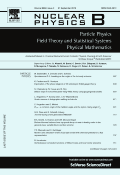
NUCLEAR PHYSICS B
Connecting Scholars in the World of Nuclear PhysicsNUCLEAR PHYSICS B, published by Elsevier, stands at the forefront of research in the dynamic field of Nuclear and High Energy Physics. Established in 1967, this prestigious journal has developed a reputation for excellence, now positioned in the Q1 category according to its 2023 quartile rankings. With an impressive Scopus rank of #21 out of 87 in its category and a commendable 76th percentile, it serves as a vital resource for scholars investigating the underlying principles of nuclear interactions and particle physics. The journal transitioned to an Open Access model in 2014, ensuring that groundbreaking research is accessible to a global audience. Its commitment to quality and innovation makes NUCLEAR PHYSICS B an essential platform for researchers, professionals, and students aiming to stay at the cutting edge of discoveries in this expansive field, contributing to the scientific discourse for nearly six decades.
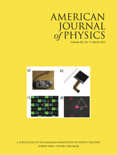
AMERICAN JOURNAL OF PHYSICS
Unveiling the Wonders of the Physical World.The American Journal of Physics (ISSN: 0002-9505, E-ISSN: 1943-2909), published by AIP Publishing, has been a cornerstone in the realm of physics education and research since its inception. With a broad scope that covers a plethora of topics in physics and astronomy, this journal serves as a vital resource for researchers, educators, and students alike, aiming to foster a deeper understanding of the fundamental principles of physics. As of 2023, it holds a commendable Q2 ranking in Physics and Astronomy (miscellaneous), reflecting its impactful contributions and rigorous peer-review process. Although the journal does not offer open access, it continues to be widely circulated, ensuring that groundbreaking research is accessible to a dedicated audience. The convergence of historical insights and contemporary advancements makes the American Journal of Physics an essential publication for those striving to stay at the forefront of the field.